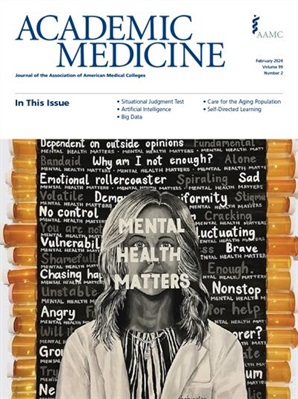Peer Support Ambassadors: A Program to Advance a Supportive and Inclusive Clinical Learning Environment.
IF 5.3
2区 教育学
Q1 EDUCATION, SCIENTIFIC DISCIPLINES
引用次数: 0
Abstract
Peer support is beneficial to physicians in distress, but few institutions have created formal programs that train residents and fellows to effectively support their peers. Existing curricula also do not address the differential experience of residents from historically excluded groups, who are more likely to experience distressing mistreatment and discrimination in the clinical learning environment. The Graduate Medical Education (GME) Peer Support Ambassador (PSA) Program aimed to address this gap by: (1) offering peer support skills and trauma-informed care training to a diverse cohort of resident leaders representing a range of specialties, (2) deploying these leaders to support their peers, and (3) facilitating opportunities for participants to train other residents in these skills. In the PSA program's inaugural year, 10 residents were trained in fundamentals of peer support, trauma-informed care, and the restorative mindset. The training increased participants' confidence and skills in these areas, increased their understanding of when to refer a co-resident for additional levels of support, and their awareness of resources for mental health care and addressing mistreatment and discrimination. Beyond the skills training, the program broadened participants' perspectives about other residents' experiences and helped them feel more connected to residents in other specialties. Opportunities to improve the PSA program include creating more opportunities for program participants to connect between sessions and after the training, publicizing the program more effectively to residents experiencing distress, and training a larger number of residents in peer support skills.同伴支持大使:促进支持性和包容性临床学习环境的计划。
同伴支持对处于困境中的医生是有益的,但很少有机构设立正式的项目来培训住院医师和研究员有效地支持他们的同伴。现有的课程也没有解决来自历史上被排斥群体的住院医师的不同经历,他们更有可能在临床学习环境中遭遇令人痛苦的虐待和歧视。医学研究生教育(GME)同伴支持大使(PSA)计划旨在通过以下方式弥补这一不足:(1) 为代表不同专业的住院医师领导者提供同伴支持技能和创伤知情护理培训;(2) 让这些领导者为同伴提供支持;(3) 为参与者培训其他住院医师这些技能提供机会。在 PSA 计划的第一年,10 名住院医师接受了同伴支持基础知识、创伤知情护理和恢复性思维方式方面的培训。培训增强了参与者在这些方面的信心和技能,提高了他们对何时将同住者转介到其他支持层面的认识,并增强了他们对心理健康护理资源以及应对虐待和歧视的意识。除了技能培训之外,该计划还拓宽了参与者对其他住院医师经历的视野,并帮助他们与其他专科的住院医师建立了更紧密的联系。改善 PSA 项目的机会包括:为项目参与者创造更多在课程间隙和培训结束后进行交流的机会;更有效地向遇到困难的住院医师宣传该项目;为更多住院医师提供同伴支持技能培训。
本文章由计算机程序翻译,如有差异,请以英文原文为准。
求助全文
约1分钟内获得全文
求助全文
来源期刊

Academic Medicine
医学-卫生保健
CiteScore
7.80
自引率
9.50%
发文量
982
审稿时长
3-6 weeks
期刊介绍:
Academic Medicine, the official peer-reviewed journal of the Association of American Medical Colleges, acts as an international forum for exchanging ideas, information, and strategies to address the significant challenges in academic medicine. The journal covers areas such as research, education, clinical care, community collaboration, and leadership, with a commitment to serving the public interest.
 求助内容:
求助内容: 应助结果提醒方式:
应助结果提醒方式:


